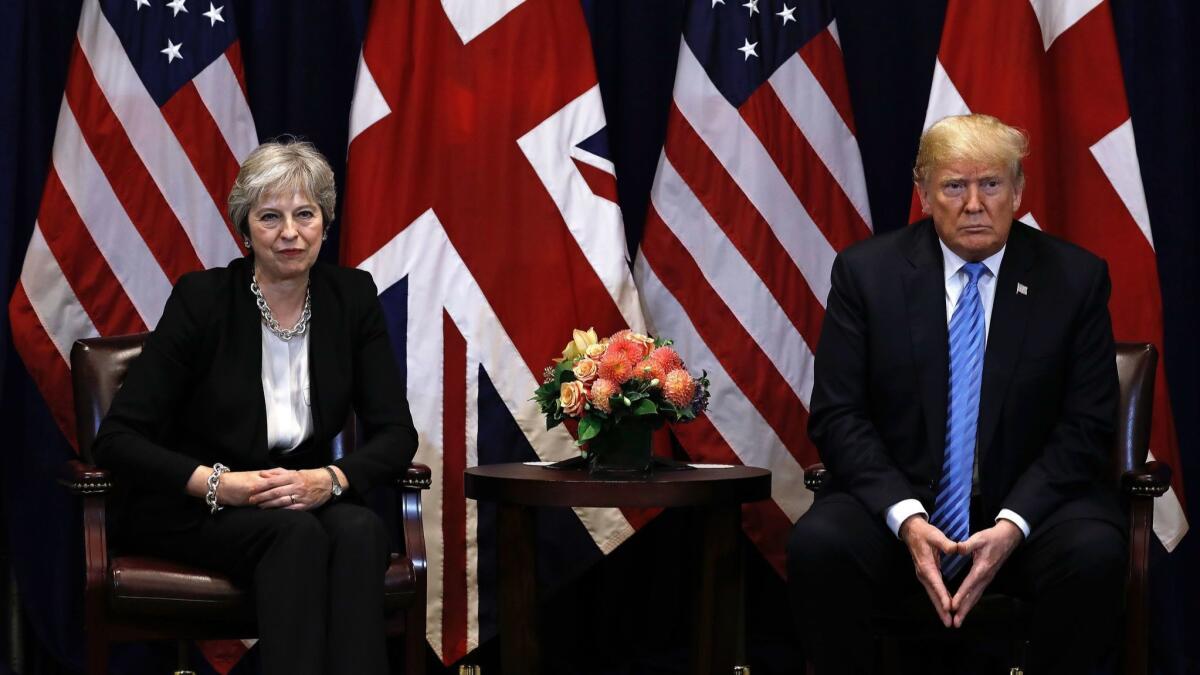Op-Ed: Dear America: The ‘Brexit’ mess will affect you too

- Share via
The U.K. is at a critical stage in “Brexit,” its departure from the European Union. For some, it’s not decisive or rapid enough. For many, it’s too much, too fast. The lack of consensus may pass or it may represent a larger crisis. It’s not clear yet.
What is clear is that for months and perhaps years, Britain will find it hard to define its role in the world, and this will make it tough for the United States and other allies to know how to work with London. Brexit’s reverberations, however distant they seem, will amount to one of the great watersheds of the post-World War II world.
Prime Minister Theresa May’s transitional exit deal, unveiled last week, will hold from the time Britain formally leaves the EU in March 2019 until it concludes a formal trade agreement with the European bloc. May’s compromises keep Britain in the EU’s customs union for the time being, preserving its trade access, but also subjecting Britain to EU rules and EU institutions, without British input.
The stability of the U.K. matters much more to the United States than most Americans may realize.
Those who most ardently supported Brexit in the 2016 referendum are furious: They want to leave the EU as quickly as possible and slam the door on their way out. Those opposed are also furious: They want to prop the door open and perhaps not even step outside at all.
May had to shoehorn the agreement through her Cabinet, and a clutch of the ministers have since resigned. Euroskeptics will vote against the agreement in Parliament; so will some pro-Europeans. It’s possible May will lose her job.
If the deal fails, Britain will have a shrinking window of time in which to negotiate a new one before it must leave in March. And the rest of the EU already feels the bloc has gone as far as it can to create a deal that works for both sides.
The alternative for Britain is a no-deal Brexit: running out of the house without bothering to pack or leave a forwarding address. That risks more economic and political chaos, since it’s unclear how Britain would import, export or deal with the rest of the world in the short term.
For all these reasons and others, Britain’s friends around the world are nervous. The United States should be nervous too.
It may seem that the United States need not worry about Britain, especially when there are so many other problematic countries to grapple with: Russia, Saudi Arabia, China. Not to mention the division and tumult within the United States.
Older Americans are liable to sigh when they see this psychodrama in London, this “Downton Abbey” with trade negotiators. Britain has gone through periods of drift and uncertainty before. Things will blow over, they may believe. Perhaps younger Americans assume that, in a Pacific era, talk of a special relationship between the two countries is sentimental and outdated.
But the stability of the U.K. matters much more to the United States than most Americans may realize. If the U.K. slides into irrelevance, the United States will lose a critical foothold in Europe and beyond.
In the meantime, if you’re looking for insight into global challenges, you won’t find it in London. It’s impossible to hold a conversation with the British political class about anything other than Brexit.
Britain isn’t focusing on other foreign policy or even other domestic priorities, though ministers keep trying to reassure allies that, for example, they remain resolute on the threat from Russia.
The country’s economy may be permanently damaged, or it may gain in the long term. But the present is a time of great confusion for those who have invested in the country — investors who, it’s worth noting, have many other options.
Enter the Fray: First takes on the news of the minute from L.A. Times Opinion »
British officials have begun the task of trying to explain their position to the rest of the world, preparing the ground for whatever happens in March. Brexit is shaping up to be one of the great unforced errors of this century: a waste of time, money and political capital on an epic scale.
America may be a spectator with little ability to affect domestic decisions in Britain, but America has a great national interest at stake. Indeed, many in Washington and in Britain’s American community feel they are watching a tragedy unfold, as a key player in the postwar era appears to be writing itself out of that role.
At some point, as a friend, Washington should feel the need to tell London: This isn’t working. It’s time to draw stumps.
Andrew Marshall is the vice president for communications at the Atlantic Council and a former foreign editor of the Independent.
Follow the Opinion section on Twitter @latimesopinion or Facebook
More to Read
A cure for the common opinion
Get thought-provoking perspectives with our weekly newsletter.
You may occasionally receive promotional content from the Los Angeles Times.










